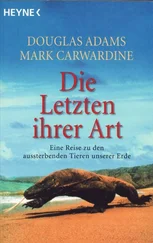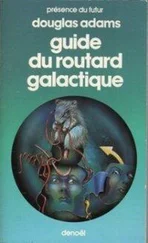Douglas Adams - Last chance to see
Здесь есть возможность читать онлайн «Douglas Adams - Last chance to see» весь текст электронной книги совершенно бесплатно (целиком полную версию без сокращений). В некоторых случаях можно слушать аудио, скачать через торрент в формате fb2 и присутствует краткое содержание. Жанр: Фантастика и фэнтези, на английском языке. Описание произведения, (предисловие) а так же отзывы посетителей доступны на портале библиотеки ЛибКат.
- Название:Last chance to see
- Автор:
- Жанр:
- Год:неизвестен
- ISBN:нет данных
- Рейтинг книги:5 / 5. Голосов: 1
-
Избранное:Добавить в избранное
- Отзывы:
-
Ваша оценка:
- 100
- 1
- 2
- 3
- 4
- 5
Last chance to see: краткое содержание, описание и аннотация
Предлагаем к чтению аннотацию, описание, краткое содержание или предисловие (зависит от того, что написал сам автор книги «Last chance to see»). Если вы не нашли необходимую информацию о книге — напишите в комментариях, мы постараемся отыскать её.
Last chance to see — читать онлайн бесплатно полную книгу (весь текст) целиком
Ниже представлен текст книги, разбитый по страницам. Система сохранения места последней прочитанной страницы, позволяет с удобством читать онлайн бесплатно книгу «Last chance to see», без необходимости каждый раз заново искать на чём Вы остановились. Поставьте закладку, и сможете в любой момент перейти на страницу, на которой закончили чтение.
Интервал:
Закладка:
`Have you gone completely mad? Mark asked me as I slipped a sixth different bottle into my hand baggage.
`I'm trying to challenge and subvert my own fundamental assumptions as to what constitutes rationally constructed behaviour.'
`Does that mean yes??
'I mean that I'm just trying to loosen up a bit,' I said. `An aeroplane doesn't give you much scope for arbitrary and alternative types of behaviour, so I'm just making the most of the opportunities that are offered.'
'I see.'
Mark shifted uncomfortably in his seat and frowned deeply into his book.
`What are you going to do with all that stuff?' he asked a while later over an airline meal.
`Dunno,' I said. `It's a problem, isn't it??
'Tell me, are you feeling nervous about something?
Yes.'
`What?'
`China.'
In the middle of one of the biggest, longest, noisiest, dirtiest thoroughfares in the world lives the reincarnation of a drowned princess, or rather, two hundred reincarnations of a drowned princess.
Whether these are two hundred different reincarnations of the same drowned princess, or the individual reincarnations of two hundred different drowned princesses, is something that the legends are a little vague about, and there are no reliable statistics on the incidence of princess-drownings in the area available to help clear the matter up.
If they are all the same drowned princess then she must have led a life of exquisite sinfulness to have had the conditions of her current lives repeatedly inflicted on her. Her reincarnations are constantly being mangled in ships' propellers, snared in fishermen's nets full of hooks, blinded, poisoned and deafened.
The thoroughfare in question is the Yangtze river, and the reincarnated princess is the Baiji, the Yangtze river dolphin.
`How do you rate our chances of seeing a dolphin? I asked Mark.
`I haven't the faintest idea,' he said. `It's very hard to get information about anything out of China, and most of it's confusing. But the dolphins are to be found - or not - in a just a few parts of the Yangtze. The main one is a stretch of the river about two hundred kilometres long centred on a town called Tongling in Anhui province. That's where there are people working on saving the baiji, and that's the main place we're headed for. We get to Tongling by boat from Nanjing, where there's a man called Professor Zhou who's a major authority on the animal. We get to Nanjing by train from Shanghai. We get to Shanghai by plane from Beijing. We've got a couple of days in Beijing first to get acclimatised and see if any of the travel arrangements are actually going to work out. We've got thousands of miles to cover and travel is meant to be insanely difficult.'
`Do we have much leeway if things go wrong?' I asked. `Which days are Professor Zhou and the others expecting us??
'Expecting us? said Mark. `What do you mean? They've never heard of us. You can't actually contact anyone in China. We'll be lucky to find them and even luckier if they agree to talk to us. In fact I'm only half certain they exist. We're going into completely unknown territory.'
We both peered out of the window. Darkness was falling over the largest nation on earth.
`There's just one last bottle left, sir,' said the cabin steward to me at that moment. `Would you like it before we close up the duty-free? Then you'll have the complete range.'
It was quite late at night as a rickety minibus delivered us to our hotel on the outskirts of Beijing. At least, I think it was the outskirts. We had no point of reference by which to judge what kind of area it was. The streets were wide and tree-lined but eerily silent. Any motor vehicle made a single and particular growl instead of merging with a general traffic hum. The streetlights had no diffusing glass covers, so the light they shed was sharp, highlighting each leaf and branch and precisely delineating their shapes against the walls. Passing cyclists cast multiple interweaving shadows on the road around them. The sense of moving in a geometric web was added to by the clack of billiard balls as they cannoned across small tables set up under the occasional street lamp.
The hotel was set in a small network of narrow side streets, and its facade was wildly decorated with the carved red dragons and gilded pagoda shapes which are the familiar stereotypes of China. We hefted our bags full of camera equipment, recording gear, clothes and aftershave into the lobby past the long glass counter displays of carved chopsticks, ginseng and herbal aphrodisiacs, and waited to check in.
I noticed an odd thing. It was one of those tiny little disorienting details, like the telephone dials in New Zealand, that tell you you are in a very distant and foreign country. I knew that the Chinese traditionally hold their table tennis bats the way we hold cigarettes. What I did not know was that they also hold their cigarettes the way we hold table tennis bats.
Our rooms were small. I sat on the edge of my bed, which was made for someone of half my height, and laid out my bewildering collection of aftershave bottles in a neat line next to two large and ornately decorated red and gold thermos flasks that were already standing on the bedside table. I wondered how I was going to get rid of them. I decided to sleep on the problem. I hoped I would be able to. I read a note in the hotel's directory of guest services with foreboding. It said: 'No dancing, clamouring, quarrelling, fisticuffings or indulging in excessive drinking and creating disturbances in public places for the sake of keeping a peaceful and comfortable environment. Guests are not permitted to bring pets and poultry into the hotel.'
The morning presented me with a fresh problem. I wanted to clean my teeth, but was a little suspicious of the delicate brown colour of the water leaking from the washbasin taps. I investigated the large flamboyant thermos flasks, but they were full of very hot water, for making tea. I poured some water from a thermos into a glass and left it to cool while I went to meet Mark and Chris Muir, our sound engineer, for a late breakfast.
Mark had already been trying to get through to Nanjing on the phone in an attempt to contact Professor Zhou, the baiji dolphin expert, and had come to the conclusion that it simply couldn't be done. We had two days to kill before our flight to Shanghai, so we might just as well be tourists for a bit.
I returned to my room to clean my teeth at last, to discover that the room maid had washed the glass I'd left out to cool, and refilled the thermoses with freshly boiled water.
I felt rather cast down by this. I tried pouring some water from one glass to another to cool it down, but even after doing this for a while the water was still hot, and the toothbrush wilted in my mouth.
I realised that I was going to have to come up with some serious strategic thinking if I was going to get to clean my teeth. I refilled the glass, carefully stuck it out of sight in the back of a cupboard, and then tried to get rid of one of the bottles of aftershave by hiding it under the bed.
We put on our sunglasses and cameras and went and spent the day looking at the Great Wall at Badaling, an hour or so outside Beijing. It looked to be remarkably freshly built for such an ancient monument, and probably the parts we saw had been.
I remembered once, in Japan, having been to see the Gold Pavilion Temple in Kyoto and being mildly surprised at quite how well it had weathered the passage of time since it was first built in the fourteenth century. I was told it hadn't weathered well at all, and had in fact been burnt to the ground twice in this century.
'So it isn't the original building? I had asked my Japanese guide.
'But yes, of course it is,' he insisted, rather surprised at my question.
'But it's been burnt down?
Читать дальшеИнтервал:
Закладка:
Похожие книги на «Last chance to see»
Представляем Вашему вниманию похожие книги на «Last chance to see» списком для выбора. Мы отобрали схожую по названию и смыслу литературу в надежде предоставить читателям больше вариантов отыскать новые, интересные, ещё непрочитанные произведения.
Обсуждение, отзывы о книге «Last chance to see» и просто собственные мнения читателей. Оставьте ваши комментарии, напишите, что Вы думаете о произведении, его смысле или главных героях. Укажите что конкретно понравилось, а что нет, и почему Вы так считаете.







